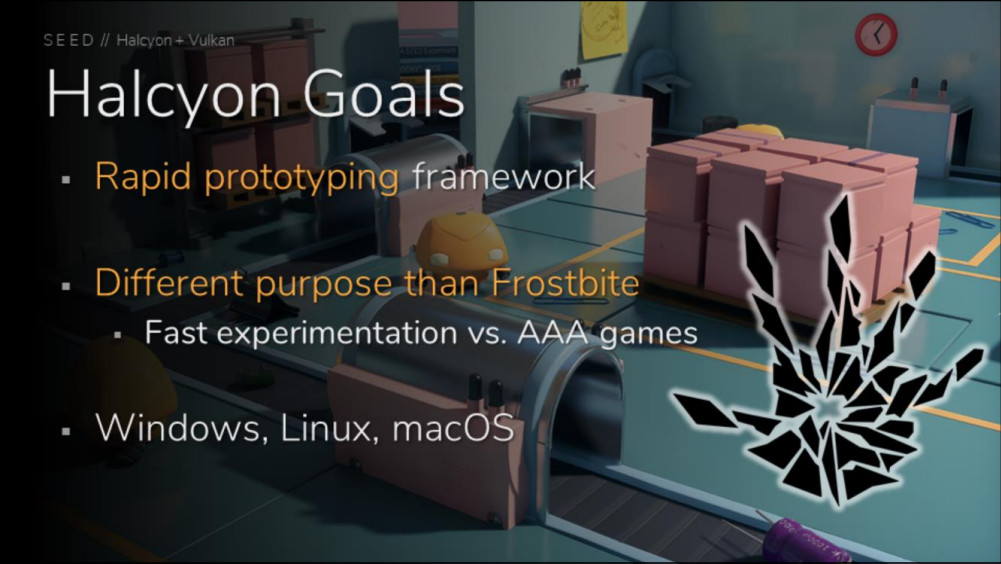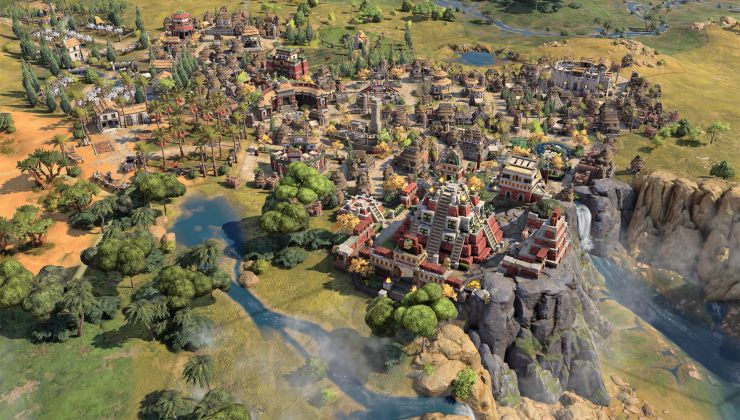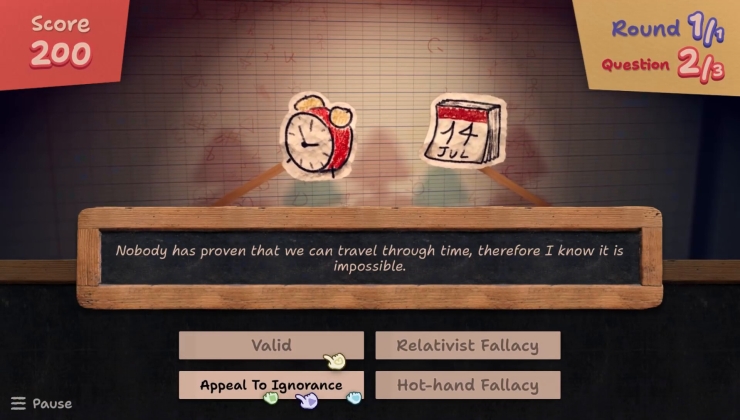It seems EA are doing some rather interesting things with their experimental Halcyon game engine which includes Vulkan and Linux support.
During the Khronos Munich Meetup this weekend, Graham Wihlidal of EA's SEED (Search for Extraordinary Experiences Division) presented a talk about this exciting game engine. While it's somewhat surprising to see EA start to use Vulkan, it's even more surprising to see Linux actually being mentioned as a target platform:
It's not just Vulkan though, it also supports Metal 2 (early stages) and Direct3D 12. On top of that, one of their aims is to easily access multi-GPU setups. However, they do mention that they haven't implemented multi-GPU support or Ray Tracing for Vulkan yet but they say it's planned.
What's also rather fascinating about it, is that they said they can mix and match different rendering backends in the same process. They say it made debugging Vulkan easier, as one half of the screen was using DX12 and the other Vulkan. Can't say I've heard of anyone else doing that, very cool.
See the full details here including a slideshow you can view online or a PDF you can download.
To keep some expectations in check: This doesn't necessarily mean EA are going to be putting out Linux games, but if they ever do start seriously using this game engine for future games it means the barrier for a Linux port could be lower. However, it might just be a bit of fun for the engineers.
Hat tip to Janz.
What the... seriously? Next thing you'll be telling me Blizzard, Ubisoft, ID/Bathesda, etc. will be tooling around with a linux-supported game and/or engine. I don't know. EA, really?Next thing you know, IBM will buy Red Hat. Wait....
Maybe I should go buy a Lotto ticket for once. This is weird.
I never though EA would make any move towards Linux. Along with Bethesda and Blizzard they have been utterly hostile against Linux. For them it is all about the money.
Some of the EA games for the Atari 8bit / c64 were some of the best around. If only they still published the Ultima games...
After ruining Ultima VIII and IX before shutting down Origin Systems?! ... no thank you!
It's not quite coincidence that a pair of villains in Ultima VII went by the names Elizabeth and Abraham. Or that the evil artefacts resembled a cube, sphere and tetrahedron.
The final EA game I bought has been Dragon Age: Origins, and that only grudgingly because of the online activation and day 1 DLC. I've got a list of companies I don't buy from, and EA is one of them.
For them it is all about the money.That's the sad part. The original intention of Electronic Arts (and the name was carefully chosen) was to acknowledge and foster the creativity of its developers, at a time when even admitting there were real people making videogames was a rarity*. Modern EA is basically the diametric opposite of what Hawkins set it up to be.
*Of course, the founding of Activision is a similar story. And it went the same way.
Have hell frozen over?Exactly. Linux is Free of charge vs Microsoft eventually will charge companies for to be inside their walled garden:
I never though EA would make any move towards Linux. Along with Bethesda and Blizzard they have been utterly hostile against Linux. For them it is all about the money.
So.. I see You want to earn a lot money using MY POPULAR Operative System.
Yes... So what?
So, You have to pay Me if you want your game running inside MY POPULAR walled garden.
If You don't, your game will not be able to get installed and run..
Your game must be available for sale and download exclusively on the Windows store and you have to pay Me a big cut of the cake.
#$%@#!!!!
...EA need a plan B, just like Valve did with their Proton initiative.
Some of the EA games for the Atari 8bit / c64 were some of the best around. If only they still published the Ultima games...
After ruining Ultima VIII and IX before shutting down Origin Systems?! ... no thank you!
It's not quite coincidence that a pair of villains in Ultima VII went by the names Elizabeth and Abraham. Or that the evil artefacts resembled a cube, sphere and tetrahedron.
The final EA game I bought has been Dragon Age: Origins, and that only grudgingly because of the online activation and day 1 DLC. I've got a list of companies I don't buy from, and EA is one of them.
To be fair I honestly think THAT is the time frame Electronic Arts became shitty. The re-designing of Ultima IX # different times was insane. The initial look of it was more on par with Neverwinter Nights, which came out years later. That one can be faulted to EA. Ultima VIII... well not sure who had the idea to use another game engine to slap Ultima into.. But Crusader games was a bad choice for it. Terrible 3D platformer is not what it should be. I actually quite liked IX, but you could tell where the story fell flat. Didn't Richard Garriott leave after 7 though? Ultima Online 2 being cancelled was the biggest EA travesty and I kind haven't really bought many games from them since then. Somehow UO is still going strong, but I recently tried it in Linux with Wine and it failed hard.
Both EA and Activision (and many more) . . . It's almost as if there were some sort of economic system pushing people to go that way.For them it is all about the money.That's the sad part. The original intention of Electronic Arts (and the name was carefully chosen) was to acknowledge and foster the creativity of its developers, at a time when even admitting there were real people making videogames was a rarity*. Modern EA is basically the diametric opposite of what Hawkins set it up to be.
*Of course, the founding of Activision is a similar story. And it went the same way.
This isn't a game engine as such, it's a render experimentation engine. It's intended to allow them to play around with rendering techniques, data sets, etc, and figure out how they want to do certain graphics before trying to plug it into their game engine(s).They also may be investagating an option of a game streaming service for their future products. (Though that's just me speculating)
This makes sense to support GNU/Linux. It probably has some server backends where that's useful, or at least automation that's very likely easier with GNU/Linux, and they won't need Windows licenses for every machine where this is run too.
Doesn't mean there will be full game engine support, but it can diffuse into driver testing, Vulkan feature development, etc, where it will be of use to the GNU/Linux graphics ecosystem. So good things overall any which way you look at it.
I also like the mention of DX12 and Vulkan being pretty much on-par for performance, with the delta being basically because they just need a little more work on the Vulkan side of things.
I actually quite liked IX, but you could tell where the story fell flat.I think both VIII and IX were rushed out the door way before they were ready for release. So definitely EA to blame. As a result, VIII feels like they cut most of the content, just to get it done, while IX was decent enough, but with a terrible story.
Didn't Richard Garriott leave after 7 though?From what I remember, Origin Systems was acquired by EA after the release of Ultima 7. Garriott didn't leave until they shut down Origin. Sometime after Ultima IX. I'm pretty sure he was involved with all the Ultimas.
Ultima Online 2 being cancelled was the biggest EA travesty and I kind haven't really bought many games from them since then. Somehow UO is still going strong, but I recently tried it in Linux with Wine and it failed hard.I'm not into online games, so can't really comment on anything going on with UO. But I'm glad I didn't put any money into Shroud of the Avatar when it was on Kickstarter. Though at least that one runs natively on Linux.
I actually quite liked IX, but you could tell where the story fell flat.I think both VIII and IX were rushed out the door way before they were ready for release. So definitely EA to blame. As a result, VIII feels like they cut most of the content, just to get it done, while IX was decent enough, but with a terrible story.
Didn't Richard Garriott leave after 7 though?From what I remember, Origin Systems was acquired by EA after the release of Ultima 7. Garriott didn't leave until they shut down Origin. Sometime after Ultima IX. I'm pretty sure he was involved with all the Ultimas.
Ultima Online 2 being cancelled was the biggest EA travesty and I kind haven't really bought many games from them since then. Somehow UO is still going strong, but I recently tried it in Linux with Wine and it failed hard.I'm not into online games, so can't really comment on anything going on with UO. But I'm glad I didn't put any money into Shroud of the Avatar when it was on Kickstarter. Though at least that one runs natively on Linux.
Ultima IX was delayed and the engine redone like 3 or 4 times, it has almost as bad a development history as Duke Nuke'em Forever. It was though one of the early 3D accelerated titles (so early it originally only worked with software rendering or 3Dfx, and Direct3D was added in a later patch.) I thought the game was amazing, but yeah there were parts where the story was just missing the things they wanted to do, but ran out of time.
Ha, I recently watched a video about UO. They had planned out this full ecology for the world. Rabbits for example would eat the plants of a region, but be slowed down due to the wolves eating the rabbits, etc. But then when they let players get online, they just instantly went out and slaughtered everything, making all that work of making the world realistic completely pointless. https://www.youtube.com/watch?v=KFNxJVTJleE
I bought Shroud of the Avatar, haven't had much time to play it, but the online seems much like UO, especially the houses everywhere so you can't move bit.
Ultima IX was delayed and the engine redone like 3 or 4 times, it has almost as bad a development history as Duke Nuke'em Forever.Yeah, I remember that the first screenshots I saw seemed fully 3d, but still had the classic top-down perspective. The final product looked nothing like that.
It was though one of the early 3D accelerated titles (so early it originally only worked with software rendering or 3Dfx, and Direct3D was added in a later patch.) I thought the game was amazing, but yeah there were parts where the story was just missing the things they wanted to do, but ran out of time.Proud owner of a Voodoo2 card back then; though I think I already had it before UIX came out.
Ha, I recently watched a video about UO.By Garriott himself, no less :-). I really liked how that man pushed boundaries back then, and I did have some hopes that perhaps the nth iteration of Shroud of the Avatar would again reach the level of Ultima 7. Alas, I don't think that's coming to pass any more.
Hmmm . . . the idea that capitalism as such is particularly associated with free markets or competition or, indeed, necessarily markets at all, is a bit of a misconception. The two things have often gone together and so they're often treated as the same thing analytically, but they're not. Capitalism is about capital, and the investment of capital to make a profit, which can then be reinvested. It is believed by many that competition among firms and/or the existence of fairly open markets can force capitalism to behave fairly efficiently rather than extracting tons of rent, but that's a modifier added on top, and at that one that the capitalists themselves must inevitably oppose since their objective is, and is supposed to be, maximizing profit, including rent.Economic system? Sort of. More specifically, it's the curse of the Intellectual "Property", which by itself is anti-competitive and [url="https://mises.org/library/against-intellectual-property-0"]anti-capitalist[/url]. Patents, copyrights, trademarks, DRM and the likes, that's what leads companies down this path...Both EA and Activision (and many more) . . . It's almost as if there were some sort of economic system pushing people to go that way.For them it is all about the money.That's the sad part. The original intention of Electronic Arts (and the name was carefully chosen) was to acknowledge and foster the creativity of its developers, at a time when even admitting there were real people making videogames was a rarity*. Modern EA is basically the diametric opposite of what Hawkins set it up to be.
*Of course, the founding of Activision is a similar story. And it went the same way.
But there's nothing conceptually to stop capitalism from operating without anything you could really call markets at all; one good contemporary example is the US military procurement system, where capitalists invest, make huge profits, and reinvest the profits to grow their firms, but do not compete or do anything that could really be considered "selling" in a "market". It's still capitalism, quite pure capitalism--that it's not a form most people like doesn't make it any less capitalist.
The same operates contrariwise--socialism is not typically associated with markets, but the basic concept says nothing about them one way or another--rather, it is associated with ownership of the means of production, the firm, by workers, the public, or the state rather than by private capital-owning individuals. In theory even the state-owned kind could involve multiple state-owned firms in any given industry, competing to sell their goods in markets. Variants where firms are mainly owned by the firm's workers assume markets more often than not. I'm on the fence about the impact of markets in non-capitalist systems, personally.
Ha, that's like one of the facebook groups I'm on, the group is supposed to be about being a game master. Then someone brought up gender politics and it became a shit show. Seriously keep that stuff outside of the gaming table people... If someone brought that up in the middle of one of my games, I don't care which side they're on, I'd kick 'em out. It's like defecating and watching porn, the two things don't belong together, so stop one or the other....Ha, that got overly political fast...
Yes, but it's educational and interesting, for offtopic discussions anyway.
Back more on topic of the video with Richard Garriott. I think that was a very great lesson in online gaming.. no matter how cool you make the world for your players, there will always be a large portion of them that are just murder hobos.
Yeah, everybody and their mother are told that capitalism is a monster which threatens the planet, rewards malignant greed and leads to big corporations ruling over the individual and lazy gamblers gaming with money at the stock market.You do realize I didn't say anything about any of that stuff, right? I would like to be quite clear that I was making analytical comments, not ethical or normative comments. I never said capitalism was bad, or socialism was good, or markets were either good or bad. I was just commenting on the relationships between them, which are not what a lot of people think they are.
But in fact, everybody and their mother are told the exact opposite of (wot you said), and all the media is owned by people in whose interests it is to make sure everyone thinks the opposite of (wot you said). There is a quiet but quite substantial system of subsidies and library gifting dedicated to spreading the works of Ayn Rand, for instance. On the other hand, nobody with money has an interest in promoting anticapitalist ideas. Given that, it's really quite surprising they are as widespread as they are. There are many persuasive arguments in favour of capitalism, or against its critics, but the idea that poor baby capitalism is just overwhelmed by the universality of anticapitalist propaganda which somehow by magic totally controls the message, is not one of them.
Nothing could be further from the truth. The stock market is a market of risks vs. rewards which offsets investments which otherwise wouldn't be given money to succeed, so it leads to production of riches, of real value. Also, capitalism is a [url="https://wiki.mises.org/wiki/Capitalism"]system of voluntary trade[/url], there is no cohercion if we're talking about the same thing. And finally, "intellectual" property cannot be part of capitalism because it is based in private property, which conceptually depends on the scarcity (or rivalry) of the good -- non-scarce goods cannot be property.I have seen all of these assertions before, many times. I have seen many refutations of them, and counterarguments for them and so on. On balance, I do not find any of these assertions convincing. Oh, except the "intellectual property" point--I quite agree that "intellectual property" is not in fact property and that it is warped to treat it as such. To me, however, the very fact that the term has been universally agreed on and pushed with such vigour in unison by so many of the wealthy and powerful of the world, and economists have generally fallen in line, suggests that actually existing capitalism has little in common with the apologetics for it that masquerade as theories.
I won't take on all those points because it's a really wide-ranging discussion. However, I'd like to make a little note about coercion. Capitalism in England, which is generally taken to be pretty much the first place capitalism took hold, operated to a fair extent by coercion from the very beginning. At the time, there were a whole lot of small farmers who individually had (mostly not owned, but rented from upper class landowners over generations) slightly less land than needed to get by--however, they had access to common land, including both fields for grazing and forests for hunting, firewood, gathering of herbs, mushrooms and so forth. Combine their own land with the commons, and these small farmers could subsist reasonably well. They tended to aim for self-sufficiency but mostly sold some surplus food as cash crops with which to get those things they could not produce themselves. But at the time, there was a new class of people rising who were making money by running workshops where people worked for pay. You have to realize this was a mostly new thing in the world--made goods were up to then created by self-employed craftsmen in guilds, their help mainly apprentices who worked for keep, a little money now and then to go to the market, and the expectation of someday becoming independent craftsmen themselves. Or just by ordinary folk for their own use.
Also new were colonies--places like Jamaica with plantations where slaves laboured to produce raw materials; England had these raw materials coming in, and there was money to be made doing stuff with them. Hence these new workshops. This was not all about technology--Adam Smith's famous "pin factory" example didn't include any new technology, the point was about division of labour.
But these workshop owners had a problem: They couldn't get enough people to work in them. Few people wanted to become entirely dependent on an unreliable--and low--money wage. They had a better deal going--the small farmers had their independent and fairly reliable self-sufficiency and were their own bosses, while to the craftspeople becoming an employee was a simple demotion. So the workshop owners, proto-capitalists you might say, got together with the big landowners and the politicians (all the same people really) and passed various laws to change the status of land; the core of it was called the "enclosure" laws. These amputated the common land. The common fields were handed over to big landowners to do more modern-style farming or to put sheep on or such; the forests were barred from common use and draconian anti-poaching laws were enacted to stop anyone from trying. Rents were raised, various means were used to shrink the small-farmers' plots of land. The result, the planned result, was thousands upon thousands of ex-farmers thrown off their land and made destitute. Harsh laws about vagrancy were enacted as well, to make it harder to just sort of bum around. The whole concept of police started to exist around this time.
Suddenly, there were lots and lots of desperate people willing to do anything to eat, and the workshop owners had a supply of cheap because desperate wage labourers. And that is how capitalism and wage labour began: Slaves overseas providing much of the raw materials, wage labour provided by people deliberately thrown into destitution so they would have no choice.
Now that said, capitalism was clearly dynamic. It reinvested surpluses, created economic growth, drove (and shaped) technological progress, prompted huge population increase. It represented a truly massive break with older systems. It could be strongly, if perhaps uncomfortably, argued that this made it worth a lot of coercion, suffering, and death, at least unless and until something better showed up. But non-coercive? Not so much.
Last edited by Purple Library Guy on 4 Nov 2018 at 7:05 am UTC









 How to set, change and reset your SteamOS / Steam Deck desktop sudo password
How to set, change and reset your SteamOS / Steam Deck desktop sudo password How to set up Decky Loader on Steam Deck / SteamOS for easy plugins
How to set up Decky Loader on Steam Deck / SteamOS for easy plugins
See more from me